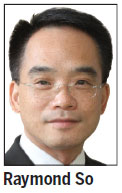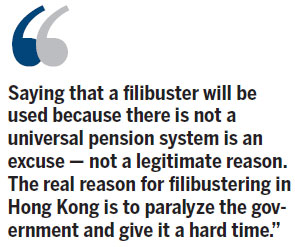Filibustering tactics destructive in HK
Updated: 2014-04-17 05:41
By Raymond So(HK Edition)
|
|||||||
Financial Secretary John Tsang presented his budget speech in February. Since then, there have been many saying the budget did not meet people's expectations. Some political groups in the Legislative Council have made it clear they will use filibusters to delay passing of the budget. The filibustering strategy has created uncertainty. If the budget is not passed, this will affect the operations of the public sector. Perhaps this is what the opposition camp really wants.
Of course, the budget could not meet everybody's expectations. By definition, a budget is a resource allocation exercise. Given that resources are scarce, the budget cannot allocate resources to everyone. In the past, the budget did not make everyone happy - yet every budget was still passed in LegCo. The reason was simple - as long as there were "sweeteners" in the budget - it was passed. Also, previously Hong Kong people did not expect the government to have much of a role in the economy. They did not have great expectations about the budget.

But all this changed with the 2011 budget. At the time, the financial secretary faced strong opposition when he pledged to inject HK$6,000 into every resident's Mandatory Provident Fund (MPF) accounts. Lawmakers threatened not to pass the budget. Under tremendous pressure, the financial secretary agreed not to go through with the plan. Instead, Hong Kong residents were given HK$6,000 in cash. This showed the lawmakers that their threats could work.
Last year, some opposition groups adopted a filibustering strategy and nearly succeeded in blocking the budget. This year they are using the strategy again.
On the surface, the case for use of filibustering is not strong. It is true it is often employed by opposition groups to confront the establishment. Filibustering is commonly used around the world, but usually without destructive intentions. Very often opposition parties employ it because they want to negotiate a better deal. Filibustering is used as a tool for negotiation rather than as a way to paralyze governments.
However, filibustering in Hong Kong is used with destructive intentions. According to the opposition groups, the rationale for filibustering is because the government did not introduce a universal pension system. But this argument is completely unreasonable. Again, the government cannot do everything people want. No single budget can meet the demands of all parties. Saying that a filibuster will be used because there is no universal pension system is an excuse - not a legitimate reason. The real reason for filibustering in Hong Kong is to paralyze the government and give it a hard time. For the opposition, this strategy is a sure winner.

Under the existing electoral system, opposition groups are guaranteed a seat in LegCo if they can get the support of the most radical voters. If LegCo candidates appear radical then they have a big chance of being elected. In order to get much-needed votes, the radical members appear to be anti-government. Not only can they consolidate their original supporters, they can also absorb new blood into their camp. Filibustering can fulfill all these objectives. So it is a very effective strategy for radical groups.
Also, filibustering can be employed to annoy the pro-establishment camp. When a filibuster is introduced to LegCo, lawmakers need to stay there for long periods of time. For pro-government forces, this is a complete waste of time. Some are frustrated or may even be absent from LegCo. This gives the media opportunities to write stories criticizing the government. Therefore, filibustering can also hurt the reputation of the pro-government forces.
Filibustering is a sign that the opposition camp will try anything to stop the normal functions of government. In future, there are many other bills likely to face a filibuster. More disagreements will emerge. The outlook is not optimistic at all.
The author is dean of School of Business at Hang Seng Management College.
(HK Edition 04/17/2014 page9)